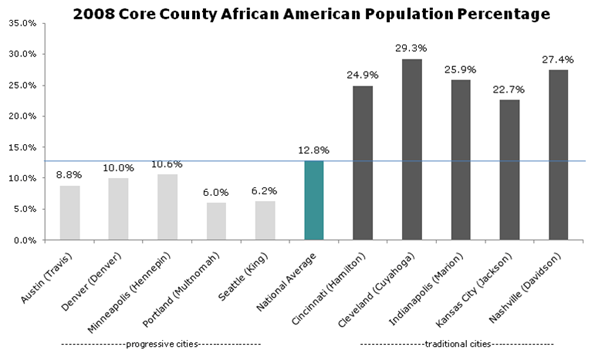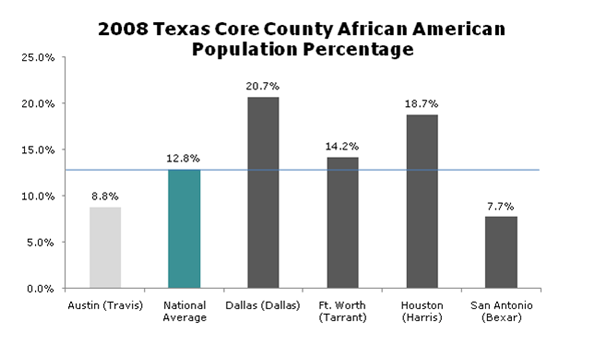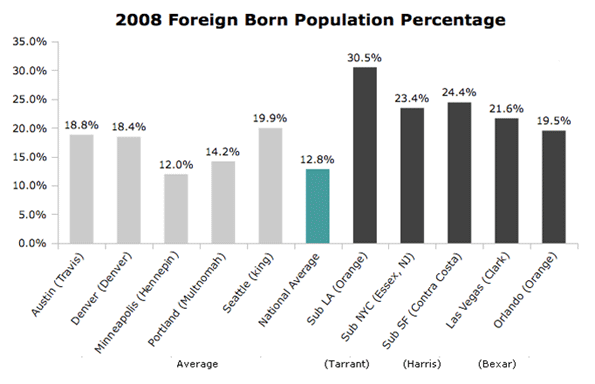
Among the media, academia and within planning circles, there’s a generally standing answer to the question of what cities are the best, the most progressive and best role models for small and mid-sized cities. The standard list includes Portland, Seattle, Austin, Minneapolis, and Denver. In particular, Portland is held up as a paradigm, with its urban growth boundary, extensive transit system, excellent cycling culture, and a pro-density policy. These cities are frequently contrasted with those of the Rust Belt and South, which are found wanting, often even by locals, as “cool” urban places.
But look closely at these exemplars and a curious fact emerges. If you take away the dominant Tier One cities like New York, Chicago and Los Angeles you will find that the “progressive” cities aren’t red or blue, but another color entirely: white.
In fact, not one of these “progressive” cities even reaches the national average for African American percentage population in its core county. Perhaps not progressiveness but whiteness is the defining characteristic of the group.

The progressive paragon of Portland is the whitest on the list, with an African American population less than half the national average. It is America's ultimate White City. The contrast with other, supposedly less advanced cities is stark.
It is not just a regional thing, either. Even look just within the state of Texas, where Austin is held up as a bastion of right thinking urbanism next to sprawlvilles like Dallas-Ft. Worth and Houston.

Again, we see that Austin is far whiter than either Dallas-Ft. Worth or Houston.
This raises troubling questions about these cities. Why is it that progressivism in smaller metros is so often associated with low numbers of African Americans? Can you have a progressive city properly so-called with only a disproportionate handful of African Americans in it? In addition, why has no one called these cities on it?
As the college educated flock to these progressive El Dorados, many factors are cited as reasons: transit systems, density, bike lanes, walkable communities, robust art and cultural scenes. But another way to look at it is simply as White Flight writ large. Why move to the suburbs of your stodgy Midwest city to escape African Americans and get criticized for it when you can move to Portland and actually be praised as progressive, urban and hip? Many of the policies of Portland are not that dissimilar from those of upscale suburbs in their effects. Urban growth boundaries and other mechanisms raise land prices and render housing less affordable exactly the same as large lot zoning and building codes that mandate brick and other expensive materials do. They both contribute to reducing housing affordability for historically disadvantaged communities. Just like the most exclusive suburbs.
This lack of racial diversity helps explain why urban boosters focus increasingly on international immigration as a diversity measure. Minneapolis, Portland and Austin do have more foreign born than African Americans, and do better than Rust Belt cities on that metric, but that's a low hurdle to jump. They lack the diversity of a Miami, Houston, Los Angeles or a host of other unheralded towns from the Texas border to Las Vegas and Orlando. They even have far fewer foreign born residents than many suburban counties of America's major cities.

The relative lack of diversity in places like Portland raises some tough questions the perennially PC urban boosters might not want to answer. For example, how can a city define itself as diverse or progressive while lacking in African Americans, the traditional sine qua non of diversity, and often in immigrants as well?
Imagine a large corporation with a workforce whose African American percentage far lagged its industry peers, sans any apparent concern, and without a credible action plan to remediate it. Would such a corporation be viewed as a progressive firm and employer? The answer is obvious. Yet the same situation in major cities yields a different answer. Curious.
In fact, lack of ethnic diversity may have much to do with what allows these places to be “progressive”. It's easy to have Scandinavian policies if you have Scandinavian demographics. Minneapolis-St. Paul, of course, is notable in its Scandinavian heritage; Seattle and Portland received much of their initial migrants from the northern tier of America, which has always been heavily Germanic and Scandinavian.
In comparison to the great cities of the Rust Belt, the Northeast, California and Texas, these cities have relatively homogenous populations. Lack of diversity in culture makes it far easier to implement “progressive” policies that cater to populations with similar values; much the same can be seen in such celebrated urban model cultures in the Netherlands and Scandinavia. Their relative wealth also leads to a natural adoption of the default strategy of the upscale suburb: the nicest stuff for the people with the most money. It is much more difficult when you have more racially and economically diverse populations with different needs, interests, and desires to reconcile.
In contrast, the starker part of racial history in America has been one of the defining elements of the history of the cities of the Northeast, Midwest, and South. Slavery and Jim Crow led to the Great Migration to the industrial North, which broke the old ethnic machine urban consensus there. Civil rights struggles, fair housing, affirmative action, school integration and busing, riots, red lining, block busting, public housing, the emergence of black political leaders – especially mayors – prompted white flight and the associated disinvestment, leading to the decline of urban schools and neighborhoods.
There's a long, depressing history here.
In Texas, California, and south Florida a somewhat similar, if less stark, pattern has occurred with largely Latino immigration. This can be seen in the evolution of Miami, Los Angeles, and increasingly Houston, San Antonio and Dallas. Just like African-Americans, Latino immigrants also are disproportionately poor and often have different site priorities and sensibilities than upscale whites.
This may explain why most of the smaller cities of the Midwest and South have not proven amenable to replicating the policies of Portland. Most Midwest advocates of, for example, rail transit, have tried to simply transplant the Portland solution to their city without thinking about the local context in terms of system goals and design, and how to sell it. Civic leaders in city after city duly make their pilgrimage to Denver or Portland to check out shiny new transit systems, but the resulting videos of smiling yuppies and happy hipsters are not likely to impress anyone over at the local NAACP or in the barrios.
We are seeing this script played out in Cincinnati presently, where an odd coalition of African Americans and anti-tax Republicans has formed to try to stop a streetcar system. Streetcar advocates imported Portland's solution and arguments to Cincinnati without thinking hard enough to make the case for how it would benefit the whole community.
That's not to let these other cities off the hook. Most of them have let their urban cores decay. Almost without exception, they have done nothing to engage with their African American populations. If people really believe what they say about diversity being a source of strength, why not act like it? I believe that cities that start taking their African American and other minority communities seriously, seeing them as a pillar of civic growth, will reap big dividends and distinguish themselves in the marketplace.
This trail has been blazed not by the “progressive” paragons but by places like Atlanta, Dallas and Houston. Atlanta, long known as one of America's premier African American cities, has boomed to become the capital of the New South. It should come as no surprise that good for African Americans has meant good for whites too. Similarly, Houston took in tens of thousands of mostly poor and overwhelmingly African American refugees from Hurricane Katrina. Houston, a booming metro and emerging world city, rolled out the welcome mat for them – and for Latinos, Asians and other newcomers. They see these people as possessing talent worth having.
This history and resulting political dynamic could not be more different from what happened in Portland and its “progressive” brethren. These cities have never been black, and may never be predominately Latino. Perhaps they cannot be blamed for this but they certainly should not be self-congratulatory about it or feel superior about the urban policies a lack of diversity has enabled.
Aaron M. Renn is an independent writer on urban affairs based in the Midwest. His writings appear at The Urbanophile.













Thank you! As another
Thank you! As another 'minority' resident of a "progressive" city, I just let out a sigh of relief from reading your comment - too many people focusing on the stats and not the reality of the article. I've always felt that the bus system was meant for us poor folks who ain't got no other way to get to the welfare store, and the light rail train was for the upper-middle class, white, stay at home mom whose trust fund recently purchased a house in the newly gentrified neighborhood. She just thinks it is so "progressive" and spectacular that the city prioritizes new street car programs and LOOK! another coffee shop just opened down the street next to the children's boutique clothing store!
P.S. Anybody else notice how those walkable coffee joints, gelato shops, etc. close incredibly early and are not open on weekends? My feeling has always been that it's done that way to avoid the working class. But what do I know about these places and why they do the things they do?
The article uses a
The article uses a provocative title to bring up some interesting questions:
Does “progressive” necessarily mean ethnically diverse?
and, does ethnic diversity require a certain percentage of African Americans?
There are a hundred ways to go with this discussion (many of them explored already), but I think the basic question is “Are these cities being unfairly held up as progressive role models?” Your answer depends largely on how you answer the first two questions above.
For what it’s worth, my answer to the first one would be “maybe, but not necessarily” – that progressiveness may include ethnic diversity but does not require it. In fact, as pointed out in the article and several comments, ethnic diversity may hinder advancement of some progressive goals.
On the second question, my answer would be “no”. This lack of a large black underclass in the large cities of the northwest is surely more a fluke of history, and not a knock against them (although this relative lack of African Americans does make for a handy criticism for folks who don’t like some of these cities’ progressive/liberal policies). From what I can tell these cities do a relatively good job of integrating their recent immigrants and ethnic minorities, offering them economic opportunity and a vision of a better life for their children.
On the other hand, for African Americans, Atlanta and Houston seem to do equally well.
So we’re still left with the basic question: Should the “non-black” cities be held up as role models for city planning? Perhaps this focus on the “Portland model” by the academic-journalistic complex (apologies to Eisenhower) is in large part due to this group consisting of mostly educated, white people, and the tendency of these people to over-romanticize old, northern European cities?
In short, maybe cities like Indianapolis would be wise to consider bus rapid-transit and more small business loans in place of the now standard light rail system.
White City
Of course, it's quite possible these places are progressive because of, not in spite of, their lack of African-American citizens: http://www.youtube.com/watch?v=Q1SZK5VJWNg
Not to pick a fight Alex,
Not to pick a fight Alex, because I think your post is a good one overall, but I find it strange someone from San Antonio would find Austin's relatively small Black population weird. I find that strange because San Antonio's Black population makes up an even smaller percentage of the city than they do in Austin.
selection bias
"If you take away the dominant Tier One cities like New York, Chicago and Los Angeles you will find that the “progressive” cities aren’t red or blue, but another color entirely: white."
Why eliminate the Tier One cities? You offer no rationale for this & I can think of none other than that it skews the population in your favor. Your entire premise is based on a biased dataset. It's like saying if you take away all the oceans planet Earth is nearly 100% land.
Another Reason
Another reason for leaving out the "tier 1" cities is that those cities are large mainly because they started that way and are now living off their legacies. The "progressive" cities the author is talking about like Portland, Seattle, Denver, and Austin were rather obscure mid-sized cities until recent decades. Their growth has directly coincided with their push to be "progressive."
And by the way, I would not consider San Francisco in that "tier 1" group -- It has gotten whiter and whiter in recent years, which has cause no small amount of controversy.
My rationale is that no one
My rationale is that no one realistically expects other cities to try to become NYC, SF, or Chicago. If you are Indianapolis, no one touts those cities as legitimate role models for you. But lots of people suggest that Portland would be a good model to follow.
Provocative Article Suffers from Flawed Logic
A fascinating article, but ultimately flawed. First of all, cities cannot control their ethnic makeup the way private employers control their workforces. Secondly, the plausibility of someone moving to flee from African Americans while appearing progressive and hip does not demonstrate that anyone has actually done this. I have written a more thorough response on my blog where I am also conducting an informal poll.
The Digital Millwright
Race Prevents a True Discussion from Happening
Like with all things having to do with race, the real problem here is that we are forced to talk about the issues in a faux polite manner... That is, we are forced to avoid the actual issues at all costs.
First of all, Atlanta may be the Capitol of the New South, but let's please dispense with the fantasy that it is a city anyone would want to copy. Yes, the city has "boomed" for various reasons (one of the main ones being that Atlanta is the largest city in one of the most economically dynamic regions of the country), but it is also a cesspool of crime and corruption. The mainly white professional class that works in those gleaming downtown towers retreats at night to largely-white enclaves such as Dunwoody or Buckhead, or to satellite suburb cities like Alpharetta, Newnan, Peachtree City, and Marietta. Blacks may dominate the political scene in the central city, but whites in the metro area largely work around the black establishment, seeing appeasing its constant racial demagoguery as merely a cost of doing business.
Want to know why progressive whites in Portland pay for mass transit? Because they are not afraid to live in, work in, or visit downtown, and so they actually use the transit system they are paying for. I myself made extensive use of public transit in Seattle because I felt safe doing so. Almost no middle-class whites in cities like Atlanta will dare use public transit because of the rough folks you tend to run into, the vast majority of whom are black. So why is it economically rational for affluent or middle-class whites to pay for a transit system they themselves would not dare use?
But as I said, these are things we are just not supposed to talk about.
The very term "white flight" is, in fact, merely a racialized denigration of an entirely reasonable phenomenon. Perhaps in the 1960s, it truly was at least in part an exodus of whites who did not want to live near blacks. But these days, such behavior is really "middle class flight." Middle-class people have the economic freedom to choose where they live, so they naturally want somewhere with a high quality of life, good schools, low crime, and a high probability that their largest investment -- their homes -- will appreciate in value. This is all perfectly logical and reasonable, and no one should fault them for this.
Unfortunately, America's black community as a whole has major problems. This is no mystery, as we all know from our daily lives and as any number of readily-available statistics demonstrate. But one of the biggest day-to-day issues this poses for whites is that white people are not allowed to notice or react to these problems. It just isn't polite. If your white neighbor is being a nuisance, you call him on it and ask him cut it out. If your black neighbor does the same thing, proper etiquette dictates that you keep your mouth shut or risk being called a racist. If a white kid smarts off to the teacher, it's detention. If a black kid in a majority-white school does the same thing, the administrators wring their hands and try to figure out a way not to punish the kid because if the racial breakdown of their detention stats gets too out of whack, they will get in trouble with Central Office.
In general, whites know (because they see it happen) that once a significant black population moves in, not only does it signal economic decline, it means the beginning of a lot of uncomfortable racial tension in which it is impossible to win if you are white. So whites do the perfectly logical thing and move elsewhere.
Some middle class blacks do the same thing for the same economic reasons, but many others end up sticking around out of a sense of racial loyalty (one of the contributing factors, by the way, to the continued problems the black community faces).
Until the economic negatives associated with the presence of large numbers of blacks is eliminated, whites of all political persuasions will continue to do what is in their best economic self-interest and move, which means they will end up largely around other white folks (and like-minded minorities, such as Asians).
Again, no one wants to talk about this stuff, but these are just facts.
As a Black "progressive" I so appreciate this, Aaron!
I also blogged about your piece over at TheRoot.com
Check it out!
Keith
http://www.theroot.com/blogs/new-geography-aaron-m-renn/can-blacks-and-w...